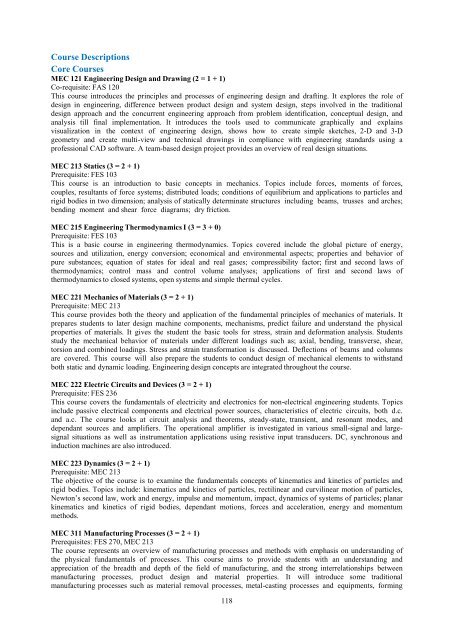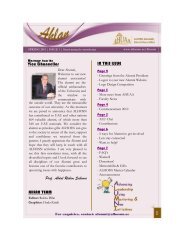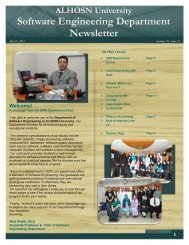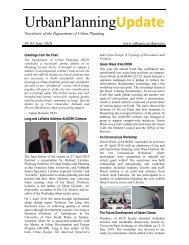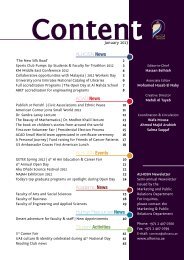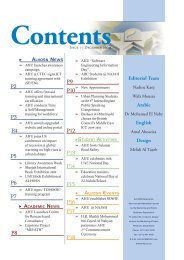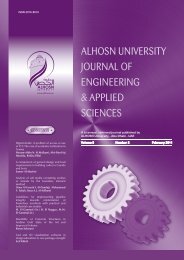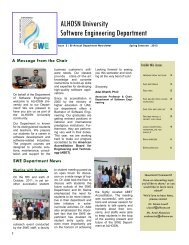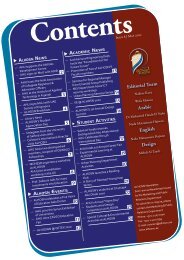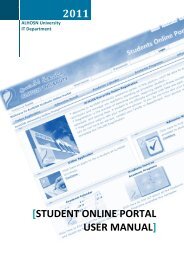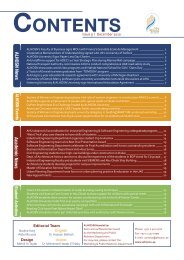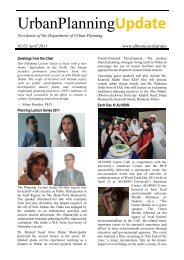ALHOSN University Catalogue Global Knowledge with Local Vision ...
ALHOSN University Catalogue Global Knowledge with Local Vision ...
ALHOSN University Catalogue Global Knowledge with Local Vision ...
Create successful ePaper yourself
Turn your PDF publications into a flip-book with our unique Google optimized e-Paper software.
Course Descriptions<br />
Core Courses<br />
MEC 121 Engineering Design and Drawing (2 = 1 + 1)<br />
Co-requisite: FAS 120<br />
This course introduces the principles and processes of engineering design and drafting. It explores the role of<br />
design in engineering, difference between product design and system design, steps involved in the traditional<br />
design approach and the concurrent engineering approach from problem identification, conceptual design, and<br />
analysis till final implementation. It introduces the tools used to communicate graphically and explains<br />
visualization in the context of engineering design, shows how to create simple sketches, 2-D and 3-D<br />
geometry and create multi-view and technical drawings in compliance <strong>with</strong> engineering standards using a<br />
professional CAD software. A team-based design project provides an overview of real design situations.<br />
MEC 213 Statics (3 = 2 + 1)<br />
Prerequisite: FES 103<br />
This course is an introduction to basic concepts in mechanics. Topics include forces, moments of forces,<br />
couples, resultants of force systems; distributed loads; conditions of equilibrium and applications to particles and<br />
rigid bodies in two dimension; analysis of statically determinate structures including beams, trusses and arches;<br />
bending moment and shear force diagrams; dry friction.<br />
MEC 215 Engineering Thermodynamics I (3 = 3 + 0)<br />
Prerequisite: FES 103<br />
This is a basic course in engineering thermodynamics. Topics covered include the global picture of energy,<br />
sources and utilization, energy conversion; economical and environmental aspects; properties and behavior of<br />
pure substances; equation of states for ideal and real gases; compressibility factor; first and second laws of<br />
thermodynamics; control mass and control volume analyses; applications of first and second laws of<br />
thermodynamics to closed systems, open systems and simple thermal cycles.<br />
MEC 221 Mechanics of Materials (3 = 2 + 1)<br />
Prerequisite: MEC 213<br />
This course provides both the theory and application of the fundamental principles of mechanics of materials. It<br />
prepares students to later design machine components, mechanisms, predict failure and understand the physical<br />
properties of materials. It gives the student the basic tools for stress, strain and deformation analysis. Students<br />
study the mechanical behavior of materials under different loadings such as; axial, bending, transverse, shear,<br />
torsion and combined loadings. Stress and strain transformation is discussed. Deflections of beams and columns<br />
are covered. This course will also prepare the students to conduct design of mechanical elements to <strong>with</strong>stand<br />
both static and dynamic loading. Engineering design concepts are integrated throughout the course.<br />
MEC 222 Electric Circuits and Devices (3 = 2 + 1)<br />
Prerequisite: FES 236<br />
This course covers the fundamentals of electricity and electronics for non-electrical engineering students. Topics<br />
include passive electrical components and electrical power sources, characteristics of electric circuits, both d.c.<br />
and a.c. The course looks at circuit analysis and theorems, steady-state, transient, and resonant modes, and<br />
dependant sources and amplifiers. The operational amplifier is investigated in various small-signal and largesignal<br />
situations as well as instrumentation applications using resistive input transducers. DC, synchronous and<br />
induction machines are also introduced.<br />
MEC 223 Dynamics (3 = 2 + 1)<br />
Prerequisite: MEC 213<br />
The objective of the course is to examine the fundamentals concepts of kinematics and kinetics of particles and<br />
rigid bodies. Topics include: kinematics and kinetics of particles, rectilinear and curvilinear motion of particles,<br />
Newton’s second law, work and energy, impulse and momentum, impact, dynamics of systems of particles; planar<br />
kinematics and kinetics of rigid bodies, dependant motions, forces and acceleration, energy and momentum<br />
methods.<br />
MEC 311 Manufacturing Processes (3 = 2 + 1)<br />
Prerequisites: FES 270, MEC 213<br />
The course represents an overview of manufacturing processes and methods <strong>with</strong> emphasis on understanding of<br />
the physical fundamentals of processes. This course aims to provide students <strong>with</strong> an understanding and<br />
appreciation of the breadth and depth of the field of manufacturing, and the strong interrelationships between<br />
manufacturing processes, product design and material properties. It will introduce some traditional<br />
manufacturing processes such as material removal processes, metal-casting processes and equipments, forming<br />
118


